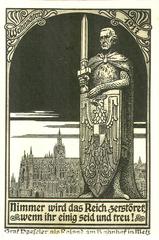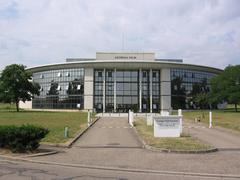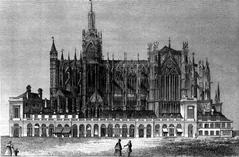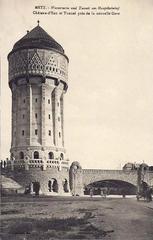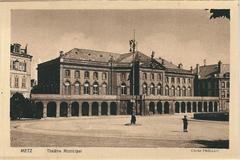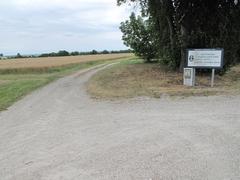Visiting Église Sainte-Thérèse-De-L’Enfant-Jésus de Metz: Guide, Tickets, Hours, and Tips
Date: 04/07/2025
Introduction
Église Sainte-Thérèse-De-L’Enfant-Jésus de Metz is a modernist architectural marvel and a vibrant spiritual center in the Nouvelle Ville district of Metz, France. Conceived in the wake of Metz’s return to France after World War I, the church is celebrated for its innovative use of reinforced concrete, its artistic stained glass, and its deep connection to the community. Dedicated to Saint Thérèse of Lisieux—“The Little Flower”—the church stands as a beacon of hope, faith, and resilience. This comprehensive guide offers detailed insights into the church’s history, architecture, cultural significance, and practical visiting information, including hours, accessibility, and nearby attractions.
For the latest updates, refer to the Metz Office of Tourism, the official parish website, and heritage platforms.
Contents
- Origins and Construction
- Architectural Style and Features
- Urban Context
- Historical and Community Role
- Spiritual and Cultural Significance
- Visiting Information: Hours, Tickets, Tours
- Accessibility and Location
- Nearby Attractions
- FAQs
- Conclusion
- Sources and Further Reading
Origins and Construction
Église Sainte-Thérèse-De-L’Enfant-Jésus arose from Metz’s rapid urban development after World War I, as the city’s southern districts expanded and the Nouvelle Ville district flourished (Metz Tourisme). Architect Roger-Henri Expert designed the church, with construction beginning in 1937. Progress was delayed by World War II and postwar shortages, but the building was completed and consecrated in 1954. Its dedication to Saint Thérèse of Lisieux reflected the era’s longing for renewal and spiritual simplicity (Patrimoine de France).
Architectural Style and Features
Modernist Vision
Sainte-Thérèse is a landmark of early 20th-century ecclesiastical modernism, pioneering the use of reinforced concrete both structurally and aesthetically (Itinéraires d’Architecture). The church’s monumental yet unadorned exterior, rhythmic arches, and fortress-like massing embody modernist ideals. The absence of lateral aisles and transept creates a unified interior, emphasizing the altar and chapels, while the 70-meter copper-clad spire—added in 1963—serves as a city landmark (Wikipedia).
Vitraux-Claustras: Stained Glass Mastery
Nicolas Untersteller’s vitraux-claustras—stained glass set in concrete lattices—are among the largest in France, bathing the nave in vibrant color and illustrating the life of Sainte-Thérèse and local traditions (visitgrandest.com). The innovative technique, while visually stunning, requires ongoing preservation due to corrosion risks (metz.catholique.fr).
Interior and Exterior
Inside, the interplay of concrete arches and stained glass creates a serene, contemplative ambiance. Artistic highlights include a sculpted effigy of Sainte-Thérèse and intricate mosaic work (Itinéraires d’Architecture). The church’s rounded apses and chapels, set on the site of the old Saint-Arnoul Abbey, blend historic resonance with modern urban planning (metz.fr).
Urban Context
Sainte-Thérèse anchors the Nouvelle Ville, a district shaped by both German and French urban planning influences. Its location at the intersection of key avenues ensures visibility and accessibility, and its modernist profile stands in dialogue with Metz’s diverse architectural heritage (Metz Ville d’Art et d’Histoire).
Historical and Community Role
From its origins, the church has been a symbol of Metz’s resilience and spiritual renewal. Surviving wartime disruptions, it emerged as a center for worship, community events, and sacred music. The church remains active, hosting regular masses, concerts, and cultural gatherings, and serving as a living testimony to 20th-century ecclesiastical innovation (Lorraine Tourisme).
Spiritual and Cultural Significance
Dedication to Sainte Thérèse de Lisieux
The church’s dedication to Sainte Thérèse de Lisieux reflects her message of humility and trust in God—values that resonated deeply with postwar France (Metz Metropolitain). The church’s annual feast day and participation in citywide religious processions underscore its active liturgical life.
Community Anchor and Cultural Hub
More than a place of worship, Sainte-Thérèse anchors its namesake quarter, hosting local festivals such as the Fête de la Mirabelle and engaging in heritage preservation. Its architecture and programming make it both a spiritual sanctuary and a center for cultural exchange (Metz Metropolitain).
Social and Interfaith Dimensions
While Catholic in tradition, the church fosters hospitality and dialogue, welcoming visitors of all backgrounds. Charitable initiatives and outreach programs reinforce its role as a pillar of community solidarity.
Visiting Information: Hours, Tickets, Tours
- Hours: Open Monday–Saturday, 9:00 AM–6:00 PM; Sunday, 8:00 AM–7:00 PM. Hours may vary on religious holidays and during events.
- Admission: Free; donations are appreciated.
- Guided Tours: Available by appointment and during special events such as European Heritage Days. Group tours should be booked in advance.
- Contact:
- Phone: +33 3 87 68 12 34
- Email: [email protected]
- Official Parish Website
Accessibility and Location
- Address: 19 Rue de la Garde, 57000 Metz, France
- By Public Transport: Several bus lines stop nearby; a 15-minute walk from Metz-Ville railway station.
- Parking: Limited street parking; public lots nearby.
- Accessibility: Ramps and accessible restrooms are provided; assistance available upon request (POP: Plateforme ouverte du patrimoine).
Nearby Attractions
- Centre Pompidou-Metz: Contemporary art museum
- Gare de Metz-Ville: Notable for its architecture
- Avenue Foch: Features early 20th-century buildings
- Jardin Botanique de Metz: Botanical gardens
- Local Cuisine: Cafés and bakeries nearby serving Lorraine specialties
FAQs
Q: What are the visiting hours?
A: Monday–Saturday, 9:00 AM–6:00 PM; Sunday, 8:00 AM–7:00 PM.
Q: Is there an entrance fee?
A: No, admission is free.
Q: Are guided tours available?
A: Yes, by appointment and during special events.
Q: Is the church accessible for visitors with disabilities?
A: Yes, with ramps and adapted facilities.
Q: Can I take photos inside?
A: Photography is permitted without flash except during services.
Conclusion
Église Sainte-Thérèse-De-L’Enfant-Jésus de Metz bridges spiritual devotion, architectural innovation, and community life. Its bold design, luminous stained glass, and dynamic liturgical and cultural programming make it essential for anyone exploring Metz’s heritage. Whether you seek spiritual reflection, architectural inspiration, or cultural discovery, a visit to Sainte-Thérèse promises a memorable experience.
For updated information, plan your visit using the Metz Office of Tourism and the official parish site. Enhance your journey with the Audiala app for guided tours and exclusive content.
Sources and Further Reading
- Metz Office of Tourism
- Itinéraires d’Architecture
- Metz Metropolitain
- Official Parish Website
- POP: Plateforme ouverte du patrimoine
- Wikipedia - Église Sainte-Thérèse-de-l’Enfant-Jésus de Metz
- Visit Grand Est
- Metz Ville d’Art et d’Histoire
- Lorraine Tourisme

